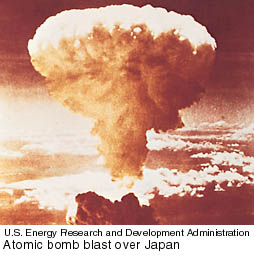
6. The development of the atomic bomb (1940's)
Perhaps no more obvious link
between human potential and human vulnerability
has ever been forged by the human mind. The atomic bomb became
the most powerful symbol of the century, and its paradoxical force remained
central for those who wrote about or imaged the century, from John Hersey's
novel Hiroshima (1946) to Stanley Kubrick's film Dr. Strangelove
or: How I Learned to Stop Worrying and Love the Bomb (1964).

|

Michael Seidel
is a Professor in the
Department of English and Comparative Literature at Columbia University. His Top
10 list reflects a broad historical approach. He also discusses the impact of
the great events on writers, artists, and humanity in general.
|


